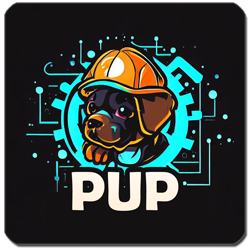@hexagon/pup
v1.0.0-rc.45
Published
Powerful universal process manager, designed to keep your scripts, applications and services alive.
Downloads
63
Readme
Pup - Universal Process Manager

Pup is a powerful universal process manager developed with JavaScript, designed to keep your scripts, applications and services alive.
For detailed documentation, visit pup.56k.guru.
Key Features
- Cross-platform: Manage processes for various languages and platforms, such as Deno, Node.js, Python, and Ruby on Windows, macOS, and Linux.
- Process management: Define, control, and manage your processes with simple commands and configuration options.
- Autostart, watch or cron: Set up processes to start automatically, on a schedule (using cron expressions), or when files change.
- Service management: Install Pup instances as a system service, supporting sysvinit, systemd, upstart, macOS, and Windows.
- Clustering and load balancing: Seamlessly scale your applications with built-in clustering and load balancing capabilities.
- Plugins: Extend Pup's functionality with custom plugins, such as the Web Interface plugin for an intuitive graphical user interface. Create your own plugins to add additional features and integrations tailored to your needs.
- Process Telemetry and IPC: Gain deeper insights into managed processes by gathering telemetry data, such as memory usage, from Deno client processes. Supports inter-process communication for connected processes to interact with each other.
- Rest API: Control and monitor Pup from third party solutions using the build in Rest API.
Note: Programmatic usage, process telemetry, and IPC are currently available only when running Deno client processes.
Quick Start
Installation
To install Pup, make sure you run the latest version of your runtime environment, then open your terminal and execute the following command:
Deno:
deno run -Ar jsr:@pup/[email protected] setup --channel prereleaseThis command downloads the latest version of Pup and installs it on your system. The --channel prerelease option is included as there is no stable version of Pup yet. Read more abour release
channels here.
Configuration and Usage
Pup revolves around instance configuration files, where each managed process belongs to an instance defined by a pup.json. This file can either be created manually, or by the command line helpers
used below:
To create a simple instances running a single process:
pup init --id "my-server" --autostart --cmd "deno run -A server.ts"If you intend to create multiple pup instances on the same server, you can pass an instance name through
--name my-instance-name. This name will also be used as the system service name.(Optional) In case you have an additional task to execute, such as a cleanup script, you can make use of
pup append. The following example shows how to add an extra task that use the cron start policy:pup append --id "my-task" --cmd "deno run -A task.ts" --cron "0 0 * * * *"(Optional) Test your instance by running it foreground using
pup run(exit by pressing CTRL+C):To make your instance run at boot, enable it using
pup enable-service.Will by default use the instance name for service name, which defaults to
pup. You can override by passing-n my-custom-name.To stream the logs from a running instance, use the command
pup monitor. To show historic logs, usepup logs.Will by default use the instance name for service name, which defaults to
pup. You can override by passing-n my-custom-name.
For the full manual, see https://pup.56k.guru
Single command example
It is also possible to use pup to keep a process alive temporary, without a pup.json or system service.
To achieve this, use pup run with --cmd and a start policy.
pup run --autostart --cmd "deno run server.ts"
Example setups
Full examples available at /docs/src/examples
Release channels
stable: This channel is currently empty, but will provide stable releases of Pup in the future. It is recommended for production environments where stability is a priority.prerelease: This channel offers pre-release versions of Pup that include new features and improvements. It is suitable for users who want to test the latest enhancements before they are officially released.canary: The canary channel provides the most up-to-date and cutting-edge versions of Pup. It includes the latest changes and may not be as stable as the other channels. It is primarily intended for developers and early adopters who want to stay on the bleeding edge of Pup's development. Based on the current state of themainrepo of the github repository.
Note Built-in plugins, such as splunk-hec and webinterace does not work with canary versions right now.
Each channel serves different purposes, so choose the one that best fits your needs and requirements.
Contributions and Development
Contributions to Pup are very welcome! Please read the contributing section of the manual, fork the repository, make your changes, and submit a pull request.
We appreciate all feedback and contributions that help make Pup better!
Examples of areas that need extra attention right now
- Plugin development: Invent new plugins for Pup, or help out by improving the existing (work in progress) web-interface plugin. See https://pup.56k.guru/examples/plugins/readme to get started on plugin development in general. See https://github.com/Hexagon/pup-plugin-web-interface for instructions on how to rebuild the web-interface.
- Testing: Pup needs to be thoroughly tested; help out by using and testing it in various scenarios. Report any issues you encounter.
- Reading: Review the documentation and report any issues or areas for improvement.
- Bugfixes: Find bugs, report them, and optionally create a PR to fix the issue.
- Spread the word: If you find Pup useful, spread the word to attract more users, developers, and testers to the community. Sharing your experience and showcasing Pup's capabilities can help grow and strengthen the project.
